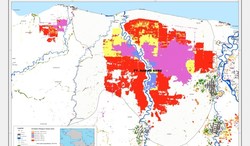FPP| 4 May 2017
RSPO freezes Goodhope’s operations in Papua

Goodhope reported of owning more than 150.000 hectare of land in Indonesia and Malaysia for their oil palm plantation. Map shows area PT. Nabire Baru, Goodhope subsidiary in Papua. Photo: Pusaka
Following a
detailed joint submission by FPP, Pusaka, Greenpeace and EIA last month, the Complaints Panel of the Roundtable on Sustainable Palm Oil (RSPO) has issued a Stop Work Order to Goodhope Asia Holdings Ltd. In
a letter to Goodhope’s Director of Sustainability, Edi Suhardi, who represents the Indonesian Growers’ Caucus on the RSPO Board of Governors, the Complaints Panel noted that the company had carried out deficient High Conservation Value assessments, had set aside inadequate areas to protect HCV areas, lacked information about the indigenous peoples’ land ownership and did not clarify how the company had acquired rights to their lands. In view of these and other procedural violations, the Panel required that land clearing operations cease in seven named concessions being developed by the company. The Panel also set out a set of milestones and timelines for the company to comply with ‘any deviation (from which)…will be viewed severely and may lead to suspension and eventual termination of membership.’
The joint submission follows an earlier complaint by FPP partner, Pusaka, filed in April 2016, which accused Goodhope’s subsidiary PT Nabire Baru of taking lands from the Yerisiam Gua people in Papua without their free, prior and informed consent, bulldozing their sago groves and suppressing dissent while hosting a military unit in the concession. PT Nabire Baru is one of the seven operations now frozen by the Panel’s ruling.
"We are encouraged to see the Complaints Panel taking rapid action to uphold the RSPO standard," said Marcus Colchester, FPP’s Senior Policy Advisor. "Hopefully this freeze will also provide a breathing space for Goodhope and the Yerisiam Gua people to settle their differences based on the RSPO-required norm that companies must recognise indigenous peoples’ customary rights to land and only develop them for palm subject to the people’s free, prior and informed consent. The Yerisiam Gua have a right to remedy having lost their lands and sago to the company without due process."












